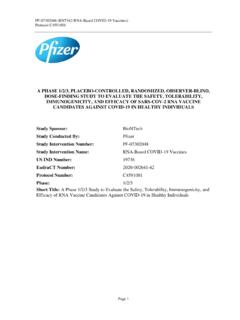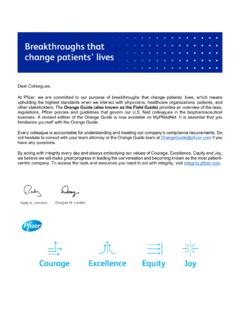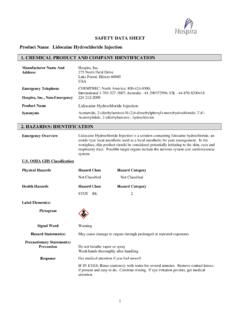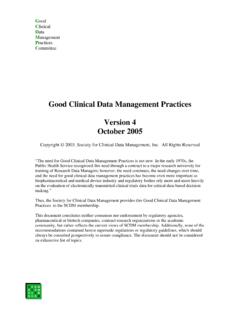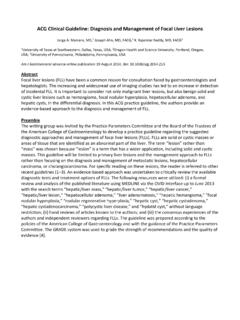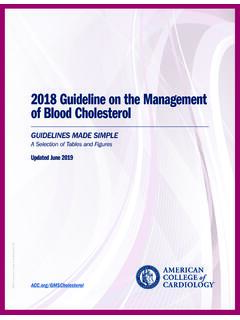Transcription of Quality Management in Clinical Trials - Pfizer
1 Clinical CASE STUDY SERIES Quality Management in Clinical Trials Clinical Trials are conducted to collect the data necessary to provide information for academia, industry, and regulators to make decisions about the safety and efficacy of the disease, illness, or preventative medicines under study. To ensure investigators are following the protocol, complying with regulatory and Good Clinical Practice (GCP) standards, and collecting and reporting Quality data, sponsors of Clinical Trials monitor the progress of Clinical Trials performed by the investigators during the Clinical trial.
2 The core components of monitoring are to ensure patient protection and to validate integrity of the data. Monitoring involves periodic on-site visits by monitors each year for the duration of a study as part of a Quality process. Significant findings identified as a result of monitoring are escalated for review by the sponsor s Clinical Teams and Quality Assurance (QA) Departments, which may then be managed as a suspected significant deviation. Risk assessments and evaluations are then conducted. There are circumstances where decisions have to be made with regard to taking remedial actions, which may include notifying regulatory authorities and ethics committees of any significant regulatory and/or GCP requirements.
3 At all times, the safety and rights of subjects are the top priority for the trial sponsor. Components for Quality Clinical research Quality is designed and embedded in the Clinical trial processes and study protocol well in advance of enrollment of the first patient. Components of the Quality process related to Clinical trial sites include: Creating, implementing, and upholding standard operating procedures (SOPs) for trial execution A Quality scientific and medical design of the protocol Clinical investigator and site pre-assessment and selection Regulatory agency and ethics committee approval Developing and providing appropriate informed consent (language, transparency of benefits and risks)
4 And obtaining ethics committee approval of the informed consent process Investigator meetings and training Adequate recording and reporting of data Periodic monitoring Audits Appropriate planning before the trial, adequate oversight and monitoring during the trial, and verification to ensure accurate reporting of results at the conclusion of the trial, create a framework for assuring Quality in Clinical studies. 1 Quality Management in Clinical Trials 2009 This systematic approach recognizes Quality must be integrated into the entire Clinical study process, not just through testing or oversight during the course of the trial.
5 The twin goals are to ensure subject protection and to deliver high Quality data: ..data that can be used without further revisions or data that will produce conclusions and interpretations that are equivalent to those that would be derived from error-free data, that is, data that are accurate, reliable, and fit for use. 1 At the core of the Clinical trial process is the reliance on the conduct, ability and diligence of the individual investigators to carry out or oversee the trial. Investigators must ensure adherence to the study protocol, regulatory requirements, and GCP standards in conducting the trial.
6 Sponsors of Clinical research have a broad range of obligations including responsibly selecting, training, and supporting investigators and monitors. These obligations have a direct impact on thousands of patients enrolled in Clinical Trials globally. However, as levels of knowledge, local regulatory requirements and standards and access to care vary internationally, Quality assurance can sometimes present challenges. The Risk Management Framework At any given time, some sponsors may be conducting hundreds to thousands of clincal Trials in locations around the world.
7 To anticipate, prevent, and address protocol, regulatory, and/or GCP non-compliance issues, should they arise, the sponsor company uses a best practice risk Management framework that considers all parts of the process, which lists controls and then tests the strength of the controls. Each potential risk is prioritized to enable the QA team to focus their efforts on particular parts of the study trial process. 1 Davis, J, Nolan, V, Woodcock, J, and Estabrook, R. Editors Assuring Data Quality and Validity in Clinical Trials for Regulatory Decision Making.
8 A Workshop Report. The Institutes of Medicine. National Academies Press, Washington, DC, 1999. 2 Quality Management in Clinical Trials 2009 Prioritizing Risk Plan and PrioritizeIdentifyAnalyzeControl andReportMonitorPlan and PrioritizeIdentifyAnalyzeControl andReportMonitorThe five steps of continuous Quality Management begin with planning and prioritizing.
9 Each consequence is assigned a severity (S), likelihood of occurrence (O) and detectibility (D). The Risk Priority Number is calculated2: = S O D Because potential risks are quantified, reducing the likelihood of occurrence, as in the control and report and monitoring phases, and the ability to detect problems, as in the identify phase, enable the analysis phase. Data Integrity Part of being proactive is to detect possible issues before they actually occur, however, with all best intentions that may not happen. In a recent case in Central Europe, Pfizer s Quality Assurance team faced a situation where the routine monitoring uncovered data collection irregularities consisting of questionable data entries.
10 In this case, one of the study s primary components was the use of patient diaries. Subjects enrolled in this trial were asked to record specific information related to the trial in a diary over the course of predetermined periods. The information related to the medical condition under investigation and was to be recorded chronologically (in real-time) by the subject under each of the specified columns within a single line for each event occurrence, which resulted in several lines of entry per day. The diary design required recording in a left to right fashion, under the respective column, the time of the event, the completion of a specified scale related to the event, etc.


